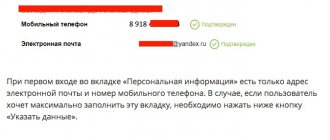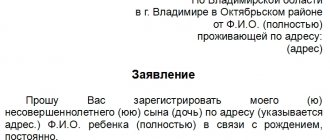0
1897
After discharge from the maternity hospital, the child is registered by the Federal Migration Service at the place of registration of the parents. For being late and not meeting deadlines, you will have to pay a fine, and problems arise when contacting social and medical organizations. Particular difficulties arise when parents do not live together, are not spouses, and there is a conflict situation between them. Such difficulties are not exceptional, they occur quite often and require prompt solutions.
A chain of articles of law that you need to rely on for an extract
Art. 304 of the Civil Code of the Russian Federation states: “The owner may demand the elimination of any violations of his rights, although these violations were not related to deprivation of possession.” This means that the registration of the ex-wife and children violates the rights of the owner to freely use the apartment, and he has the right to demand the elimination of these violations. Of course, if there are legal grounds for this.
Next, it is important to know on the basis of which articles you can write out your ex-wife and children SEPARATELY. Only after this the owner will have an understanding of how to write them all out at once. After that, I analyzed individual situations.
ex-wife
- First, it’s worth clarifying how the owner got the apartment. Some citizens do not take this into account. The options are:
- The apartment was purchased by the owner before marriage, or received by gift, privatization or inheritance (no difference between marriage or before marriage). According to paragraph 1 of Art. 36 of the RF IC, in these cases the apartment is not considered joint property, which means the ex-wife has nothing to do with the apartment.
- The apartment was purchased during marriage, but the ex-wife is not the owner. Then the apartment is the common property of BOTH spouses, even if it is registered in the name of only one of them - clause 2 of Art. 34 RF IC. Therefore, according to the law, the ex-wife owns a share of the purchased apartment, although nothing is indicated about it in the documents or Rosreestr. After a divorce, joint property “does not disappear”, the former spouses simply become participants in joint property - Art. 253 Civil Code of the Russian Federation. The same applies when the apartment was received during marriage under an exchange agreement - clause 2 of Art. 567 Civil Code of the Russian Federation.
What to do? There are two options: 1) It is better to file a claim for the division of joint property, and not for the release of the ex-wife. I advise you to divide everything according to the law. 2) You can try to write out your ex-wife 3 years after the divorce. Based on clause 7 of Art. 38 of the RF IC and clause 1 of Art. 200 of the Civil Code of the Russian Federation, the limitation period is 3 years from the moment when a person learned or should have learned about a violation of his right. According to the logic of these articles, 3 years can be counted from the moment of divorce. But there is another problem. If the ex-wife finds out that she has been discharged or wants to be discharged, she will sue for the division of property. At the trial she will say that she decided to do this because... her rights were violated. Therefore, I advise dividing the property.Exception: the purchased apartment is not considered common property if the spouses signed a marriage contract, which states that only one of the spouses owns the apartment - clause 1 of Art. 33 and art. 42 RF IC.↓
- Paragraph 13 of the Supreme Court Resolution No. 14 of July 2, 2009 - after a divorce, family relations with the ex-wife are terminated, so she automatically becomes a former member of the owner’s family.↓
- Clause 4 art. 31 of the Housing Code of the Russian Federation - a former family member does not retain the right to reside in the owner’s apartment unless there was another agreement between them. In simple words, the ex-wife does not have the right to live in the apartment unless there is another agreement. Therefore, she can be discharged even if she lives there. The main thing is that there is a fact of termination of family relationships - this is a divorce.
It doesn't matter whether the ex-wife pays utility bills. Even if this is so, it is enough to write about it in the statement of claim and that’s it. There is no need to prove anything.
Adult child (son or daughter)
Here you need to clarify when the adult child was registered in the apartment - after March 1, 2005 or before. Because from March 1, 2005, the Housing Code of the Russian Federation is in force, and until this date the Housing Code of the RSFSR is in force.
- The adult child was registered after March 1, 2005.
Clause 4 art. 31 of the Housing Code of the Russian Federation - former members of the owner’s family do not retain the right to reside in the apartment. Therefore, in order to discharge an adult child, the owners need to recognize him in court as a former family member. Kinship in this case does not matter here.↓The conditions for recognizing an adult child as a former member are specified in paragraph 13 of the Resolution of the Plenum of the Supreme Court of July 2, 2009 No. 14. These conditions are accepted by the court IN THE CUMULATION and are decided on the specific circumstances of each case:
- Adult children and their owners do not provide each other with support and assistance; there are conflicts and disagreements in the family.↓
They do not maintain a common household.↓
- There is no common budget between them, it is separate.↓
- They do not live in the apartment and do not pay utility bills - these conditions are optional, but will be additional advantages.
- The child was registered until March 1, 2005.
Based on clause 2 of Art. 127 Housing Code of the RSFSR, former family members of the owner retain the right to reside in the apartment. Here the chances are 50/50 - half of the judges discharge, the others refuse to discharge. Moreover, even if the child does not live in the apartment, does not pay utilities and has other property in his property.There is a way out - to change the owner. The Civil Code of the Russian Federation will come into force here. Clause 2 Art. 292 of the Civil Code of the Russian Federation - the transfer of ownership to another person is the basis for termination of the right of use by family members of the previous owner. In simple words, adult children of the previous owner do not have the right to live in the apartment after the transaction. This means the new owner will be able to write them out.
The main conditions are numbered 1, 2 and 3. Therefore, in the statement of claim, the owner must indicate that family relations with the child have been terminated. The child has become a former member of the family because there is no common household between the owner and the child, no common budget, no mutual assistance, no respect, and that there are constant conflicts. On this basis, we ask that he be recognized as having lost the right to use the apartment. The fact of non-residence is also worth indicating. The same thing needs to be reported in court.
Even if an adult child lives in the apartment and/or pays his share of the utilities, the owner still has a great chance of discharging him. The main thing is to “put pressure” on ending family relationships.
Minor child
Everything is different here. A parent will not be able to discharge his minor child (son or daughter), even if he does not live in the apartment after the divorce.
Why? This is judicial practice. Divorce of parents and their separation do not affect the rights of the child, including housing rights - clause 1 of Art. 55 and paragraph 1 of Art. 63 RF IC. Therefore, divorce is not grounds for losing a child’s right of residence. In addition, the child, due to his age, cannot independently exercise his right to residence, and therefore lose it. Therefore, he may not live at his place of registration. All this is indicated in paragraph 14 of the Supreme Court Resolution No. 14 of July 2, 2009.
The solution is the same - change the owner. The new owner will be able to write out on the basis of clause 2 of Art. 292 of the Civil Code of the Russian Federation - the transfer of ownership to another person is the basis for termination of the right of use by family members of the previous owner.
Documentation
In order for the acceptance of papers for registration of a child after a divorce to take place, you should make sure that the package contains everything you need, and these are the following documents:
- application of the parent (who remained with the child) with a request for registration at his place of residence;
- certificate of divorce;
- child's birth certificate;
- passports of both parents;
- statement from the second parent that there are no objections to registration at the address of the first;
- a certificate of absence of registration of the child at the address of the second parent (so that registration is not duplicated);
- sometimes - a court decision in a divorce case.
When registering a child, the state of payment for utilities does not matter - the offspring will definitely be registered with the mother (or father).
The laws of the Russian Federation require registration of all residents, and since all bodies and services are linked territorially, a citizen himself will not be able to exist normally without registration.
After a divorce, the family does not exist as a whole, but this statement is relevant only for a man and a woman, and as parents they are obliged to take care of their offspring together, and they will have to decide where the child will be registered after leaving.
The cub will be registered with the mother or father unconditionally, without asking permission from landlords or owners. For example, an ex-husband can register his child with him.
A child officially registered at his actual place of residence will be able to easily get a place in a kindergarten or school, or receive help at a children's clinic.
Having completed a simple procedure, a parent who remains with a child after a breakup with his legal spouse can easily register the child at his address.
Tags: dacha, divide, mother, register, child
« Previous entry
Now let’s briefly analyze the situations and what to do for each of them.
- Situation No. 1 - to discharge an ex-wife with children when one of them is a minor. Or all the children are minors.
What to do? Since the parent will not be able to register his minor child (more details), it is necessary to change the owner “temporarily”. The main thing here is that the parent of a minor child is not listed as the owner of the apartment before the trial. Or waiting for the child to come of age is the next situation.IMPORTANT: You should not make it so that the new owner is a grandparent of a minor child. Courts refuse to allow owners to sign out their minor grandchildren. Why? Clause 4 art. 31 of the Housing Code of the Russian Federation - former members of the owner’s family with whom family relations have been terminated do not have the right to live in the apartment. Even if the owners say in court that they recognize their minor grandchildren as former members of the family and family relations with them have been terminated, they will still be denied an extract. The courts believe that family relationships between grandparents and their grandchildren cannot be terminated. And it doesn’t matter that - 1) The grandparents themselves did not register their grandchildren in the apartment, the previous owner did this. 2) Even when the grandson has not lived in the apartment for a long time, because, due to his age, he cannot independently exercise his right to residence, and therefore lose it. Therefore, he may not live at his place of registration. Although I believe that this is not entirely legal, this is judicial practice.
You can change the owner through a donation or purchase and sale. Which one is better depends on the specific situation. If you give real estate as a gift, it is better to give it to a close relative - then the recipient (who was given the gift) will not have to pay tax (clause 18.1 of Article 217 of the Tax Code of the Russian Federation). Close relatives - parents, spouse, sibling. I wrote above that there is no need to make sure that the new owner is the minor child’s grandparent. They won't be able to write them out. If the owner has a sibling, then it is better to give it to them. It’s okay that the new owner will be the minor child’s uncle/aunt. Judicial practice shows that if the owner himself did not register his nephew/niece, but the previous owner registered them, he will be able to register them on the basis of clause 2 of Art. 292 of the Civil Code of the Russian Federation.
Instructions - how to donate an apartment. If the owner only has a share, then a notarial agreement will be required when donating - more details. Instructions - how to donate a share in an apartment. The length of ownership does not matter - the donor does not pay tax, even if he owns the property for less than 3 years.
Instead of donating the apartment, you can sell it. Better for a distant relative or non-relative. And after checkout, resell the apartment back. To prevent the new owner from being subject to tax when selling the apartment back, both transactions must be completed within one year (tax period) and for the same price. For example, sell an apartment in March 2020 for 4 million rubles. The trial lasts approximately 3 - 5 months. After check-out, immediately sell the apartment back for the same 4 million rubles. It will be available sometime in September 2020. No one will pay tax, because everything was done in one calendar year (tax period).
Follow the link to find a list of documents for selling an apartment for cash, because our sale will be temporary. If the child's parent only has a share, our instructions are how to sell the share.
The new owner must indicate in the statement of claim that family members of the previous owner (his ex-wife with children) do not have the right to live in the apartment on the basis of clause 2 of Art. 292 of the Civil Code of the Russian Federation. If they have already left, this must also be indicated. It will be an additional plus. The same thing needs to be said at the trial.
- Situation No. 2 - discharge your ex-wife and adult children.
Children were registered after March 1, 2005. How to write it out? There is no need to change the owner here. The owner must be informed in the lawsuit and in court: 1) Family relations with the ex-wife have been terminated, she is a former family member and there were no agreements regarding her residence after the divorce. And if there were, they are now terminated. 2) There is no mutual assistance and respect between the owner and the adult child, there is no common household, they have a separate budget, there are constant quarrels and disagreements. Thus, family relations between them were terminated and he became the owner of a former family member, therefore he lost the right of residence on the basis of clause 4 of Art. 31 Housing Code of the Russian Federation. 3) If any of them does not live in the apartment, this must also be reported. It will be additional evidence of the termination of family relationships. - Situation No. 3 - to discharge an ex-wife and adult children, where one of them was registered before March 1, 2005. Or both children.
The same situation as with a minor - you need to “temporarily” change the owner. The main thing is that the child’s parent is not the owner before the trial. And the new owner will be able to write them all out under clause 2 of Art. 292 of the Civil Code of the Russian Federation.The apartment can be donated or sold - it all depends on the specific situation. If you give it as a gift, it is better to give it to a close relative, so that the recipient (to whom it was given) does not have to pay tax. Close relatives - parents, spouse, sibling (Clause 18.1, Article 217 of the Tax Code of the Russian Federation). In this situation, you can donate an apartment to: 1) one of the parents who will be the adult child’s grandparent. 2) a sibling who will be the child’s uncle/aunt. And the new owners will discharge the adult child on the basis of clause 2 of Art. 292 of the Civil Code of the Russian Federation. The main thing here is that the new owner did not register an adult child, the previous owner did this. Kinship doesn't play a role here. I have provided a link to the donation instructions above.
Or the apartment can be sold. Then it is better for a distant relative or a non-relative. And after checkout, resell the apartment back. To prevent the new owner from being subject to tax when selling the apartment back, both transactions must be completed within one year (tax period) and for the same price. For example, sell an apartment in April 2020 for 5 million rubles. The trial lasts about 3 - 5 months. After checkout, sell the apartment back for the same 5 million rubles. It will be available around October 2020. No one will pay tax, because everything was done in one calendar year (tax period).
During a divorce, the husband claims the apartment purchased before marriage
However, quite often you can see that one of the spouses is not engaged in work: providing for the family in this case falls entirely on the shoulders of the working person. But according to the current laws of the Russian Federation, the income received by a husband or wife is common, which means that everything purchased with this money will be considered property acquired jointly by the spouses. Accordingly, in the event of a break in family relations, it should be divided in equal shares.
This is interesting: Young Family Benefit Up to 25
Residence address is the registration address
One of the most frequently asked questions is “The ex-wife and children have moved out of the apartment. What address should I indicate in the statement of claim and other documents? Actual address? What if he is unknown?
According to the logic of the court, the place of residence of the defendant is considered to be the place of his registration - paragraph 63 of the Resolution of the Plenum of the Supreme Court of June 23, 2015 N25. Therefore, in the statement of claim, we indicate the address of residence of the ex-wife and children as the address of their registration - the apartment from which the owners need to deport them. The plaintiff is not required to know where the defendant actually lives.
As a result, all subpoenas to the ex-wife and children will be sent to a place where they may not actually live - Art. 113 Code of Civil Procedure of the Russian Federation. If they do not receive a summons (because they do not live there), the court will still consider that everything has been done to notify them. The law is respected here. Receiving correspondence is a citizen's responsibility. If they do not appear in court, the case will be considered without their participation - clause 4 of Art. 167 Code of Civil Procedure of the Russian Federation.
We'll help you with your checkout
Our law office "Bessonov and Partners" offers residents of Moscow or the region. We will take on all the possible work - we will draw up a correct statement of claim, collect all the necessary documents and submit them to the court. You will not need to come to court hearings; the office's lawyer will participate in them and will do everything possible to win the case. At the end of the trial, we will bring you a copy of the court decision.
We have been working in the field of court records since 2008 and have won 84% of court cases.
The cost of the service is 50 - 60 thousand rubles. For visitors to this site there is a discount of 5% to 10%. To receive it, say that you came from the website “Prozhim.com”. For all questions and for a free consultation, call the number (daily from 9:00 to 21:00 Moscow time / only for residents of Moscow and the region).
If the child is registered with the father during a divorce
The wife goes to court, suing her ex-husband, and asks for an honest division of the property that, in her opinion, was acquired jointly. She expects to obtain ownership of ½ of each of the two existing apartments. The wife justifies this requirement by the fact that the housing was acquired during the marriage, therefore the apartments should be classified as jointly acquired property and divided equally. The magistrate does not satisfy the claims, after which the woman files an appeal.
This is interesting: Program to Expand Housing for Young Families
Stage No. 3 - Go to court
You can go to court immediately after visiting the post office (previous stage). The trial usually lasts from 2.5 to 5 months, although the law says about a maximum of 2 months - clause 1 of Art. 154 Code of Civil Procedure of the Russian Federation.
If one of the plaintiffs is under 14 years old, one of the parents/guardians must go to court instead - Art. 28 Civil Code of the Russian Federation. If he is from 14 to 18 years old, his presence is mandatory and together with one of the parents/guardians - Art. 26 Civil Code of the Russian Federation.
- We submit documents to the court reception.
Let me remind you that only one of the owners can submit an application to the court and participate in it; all of them do not have to. Whoever appears in the statement of claim as a plaintiff is the one who files. Or this can be done by a hired lawyer/lawyer under a power of attorney.You need to go to court at the location of the apartment - Art. 24 and art. 28 Code of Civil Procedure of the Russian Federation. In large cities these are district courts, in smaller cities and villages - city courts.
First, you need to get the details for paying the state fee from the court office. Its amount is 300 rubles (clause 3, clause 1, article 333.19 of the Tax Code of the Russian Federation). Usually the details are posted on the information stand. It is better to pay the state fee at any bank so that they issue a receipt for payment.
After payment, you must provide the following to the court (expedition) reception: 1) the above documents; 2) inventories and receipts for sending documents to defendants and third parties (copies); 3) original check with receipt for payment of state duty.
The court employee will put a stamp on copies of the statement of claim with the date of acceptance and the entry number. One copy will be returned to the plaintiffs.
Sample of a stamp confirming the acceptance of a statement of claim
- The judge will consider the application and set a date for the preliminary hearing..
Within 8 - 10 working days from the date of filing the documents, the judge will consider the statement of claim and decide what to do with it next - accept, reject or leave without movement (clause 1 of Article 133 of the Code of Civil Procedure of the Russian Federation).If everything is in order, the judge will set a date and time for a preliminary hearing. It will take place in approximately 20-30 days, depending on the judge’s workload. The court will send by registered mail to the plaintiff(s), defendant(s) and third parties a summons about the date, time and place of the hearing - clause 2 of Art. 113 Code of Civil Procedure of the Russian Federation.
It is better for plaintiffs to check with the judge about the date of the preliminary hearing a week after filing the statement of claim. Judges usually see citizens on Monday and Thursday. The name of the judge will be stated in the office (expedition) of the court.
- Preliminary meeting.
It is a preparation for trial - Art. 152 Code of Civil Procedure of the Russian Federation. In it, the judge listens to the plaintiffs' demands and reviews the submitted documents. If there are not enough documents, the judge will indicate which ones should be submitted.If the plaintiffs do not know about the defendants’ other real estate, they should petition the court to request this information from Rosreestr. In this case, the judge will receive extracts from the Unified State Register using the full names of the defendants - about the rights of an individual to the real estate he or she owns. An ordinary citizen cannot receive them.
After this, a date and time for the court hearing will be set. It takes place 10-30 days after the preliminary one. The parties will again be sent subpoenas - Art. 113 Code of Civil Procedure of the Russian Federation.
- Court hearing.
By law, defendants must be notified twice. Therefore, if they do not come to the first meeting, another one will be scheduled. It will pass 10-30 days after the first one. If the defendants do not come to the second hearing, the court will consider the case without them - Art. 167 and art. 233 Code of Civil Procedure of the Russian Federation.Additionally, the judge may request the defendants’ phone numbers from mobile operators, providing their full names. Then he will call or via SMS inform them about the court hearing.
What do plaintiffs need to do at trial? It all depends on the specific situation - I analyzed each of them here - link up. And I described which articles of the law to rely on at the beginning of the article. You can invite witnesses who will confirm all this.
If the court learns that the defendants own real estate, this proves that they have a place to live.
- The court's decision is announced .
As a result, the judge will announce a decision in favor of one of the parties - Art. 193 Code of Civil Procedure of the Russian Federation. If the defendants were present at the trial, the decision will be in person. If you were not present, then either in person or in absentia. At the discretion of the judge. - Pick up a copy of the court decision in its final form . Usually it is issued 8 - 10 days after the announcement. You can find out about its readiness by calling the court office. A copy for the defendants will be sent to them by registered mail - to the address of the apartment from which they were discharged.
Should a child live at the mother’s place of registration after divorce?
- The disposal of property in shared ownership is carried out by agreement of all its participants.
- A participant in shared ownership has the right, at his own discretion, to sell, donate, bequeath, pledge his share or dispose of it in any other way, subject to the rules provided for in Article 250 of this Code during its alienation for compensation.
- collect the required papers, make the necessary copies;
- obtain written consent from one parent to register with the one who, after the divorce, will permanently live with the child;
- show up during office hours at the MFC or at the housing department at the place of registration of the parent who is registering the child;
- At the appointed time, come for the original birth certificate of the child.









